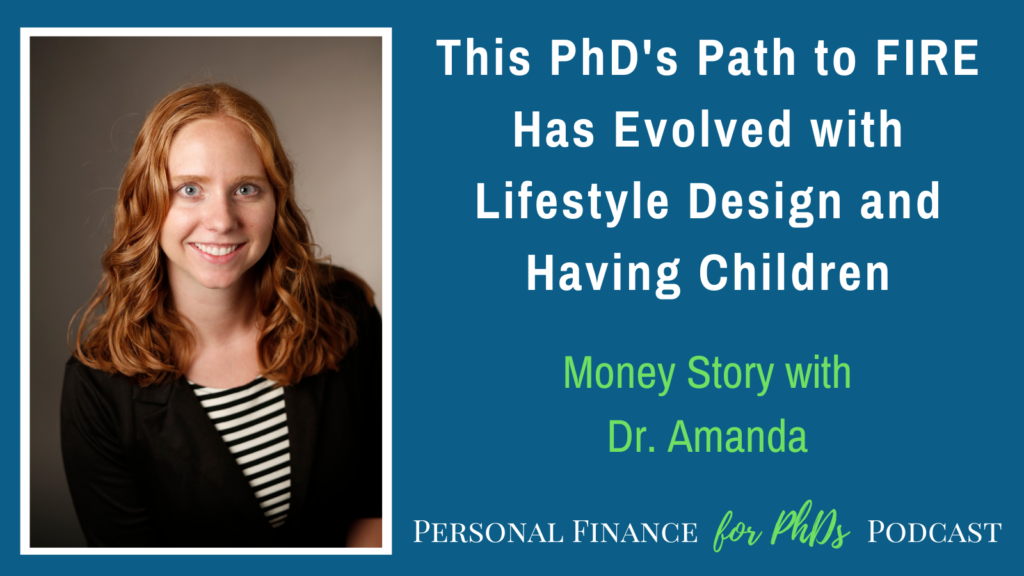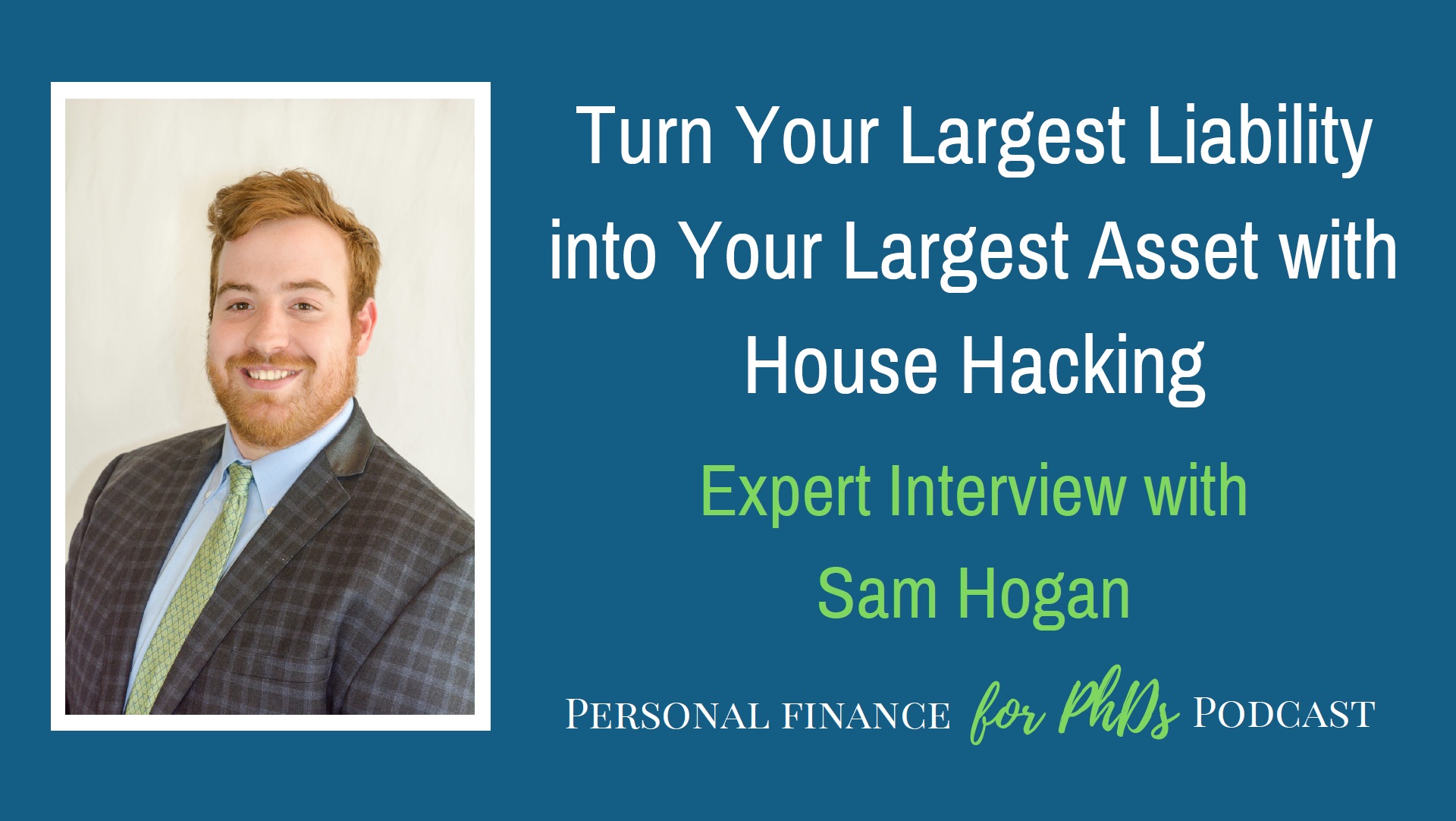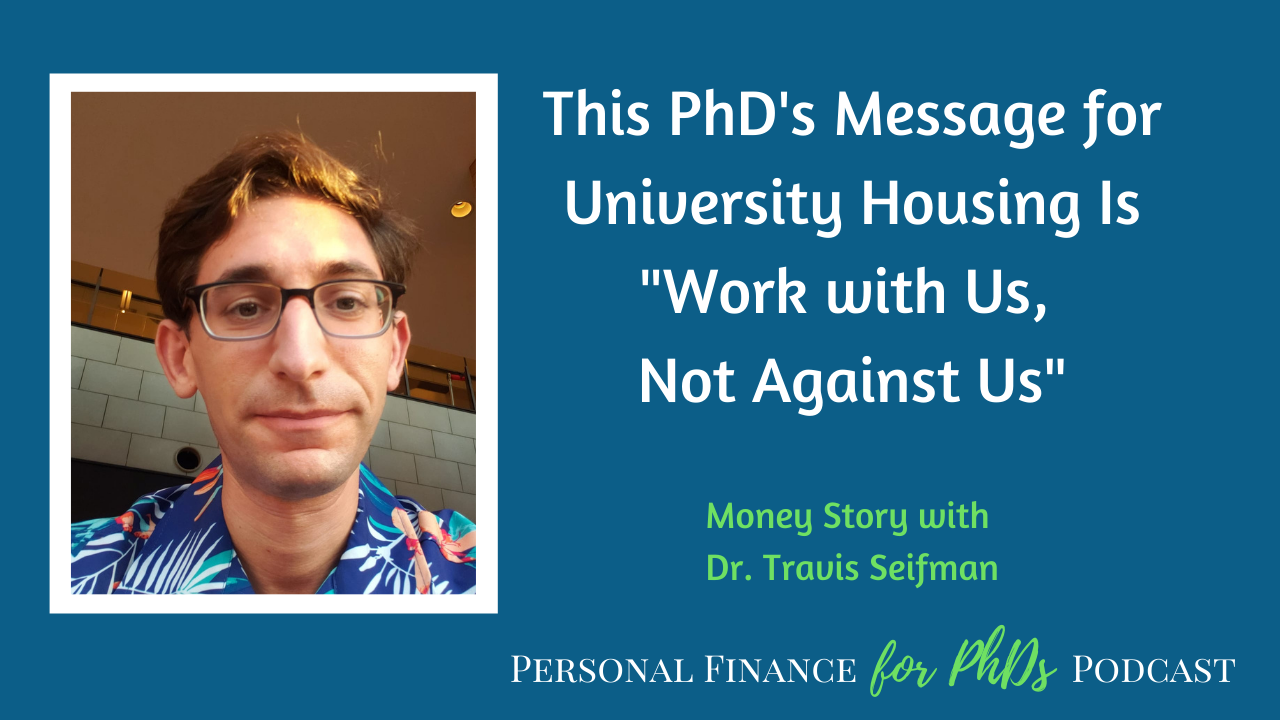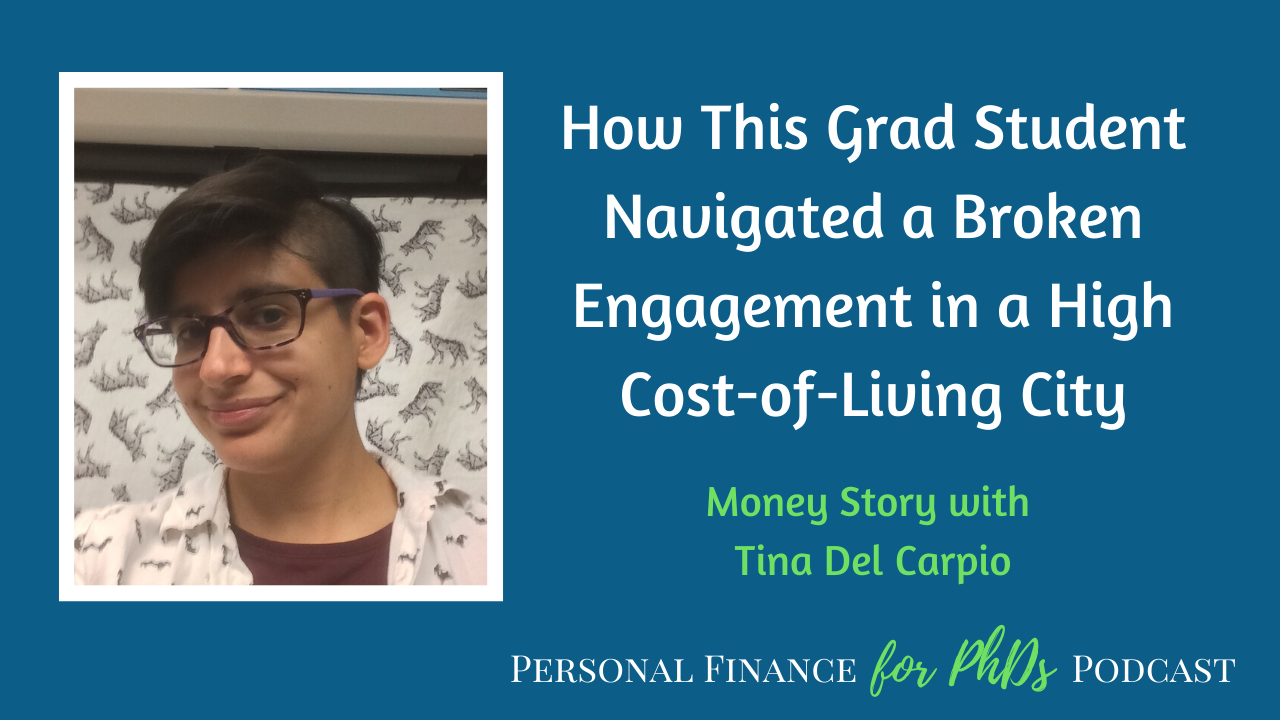In this episode, Emily interviews Hannah Takasuka, a 3rd-year PhD/DDS student at the University of California, San Francisco. Hannah is in the process of purchasing a condo in San Francisco as part of a governmental program to provide affordable housing. Hannah overcame multiple hurdles in the journey to home ownership, including being rejected by mortgage lenders over her fellowship income. Several puzzle pieces have to come together for any graduate student to purchase a home, and Hannah shares all the numbers and details for how it happened for her.
Links mentioned in the Episode
- Hannah Takasuka’s LinkedIn
- PF for PhDs Spring 2025 Giveaway
- PF for PhDs AMA with Sam Hogan on the PhD Home-Buying Process
- Host a PF for PhDs Seminar at Your Institution
- Emily’s E-mail Address
- PF for PhDs Subscribe to Mailing List
- PF for PhDs Podcast Hub
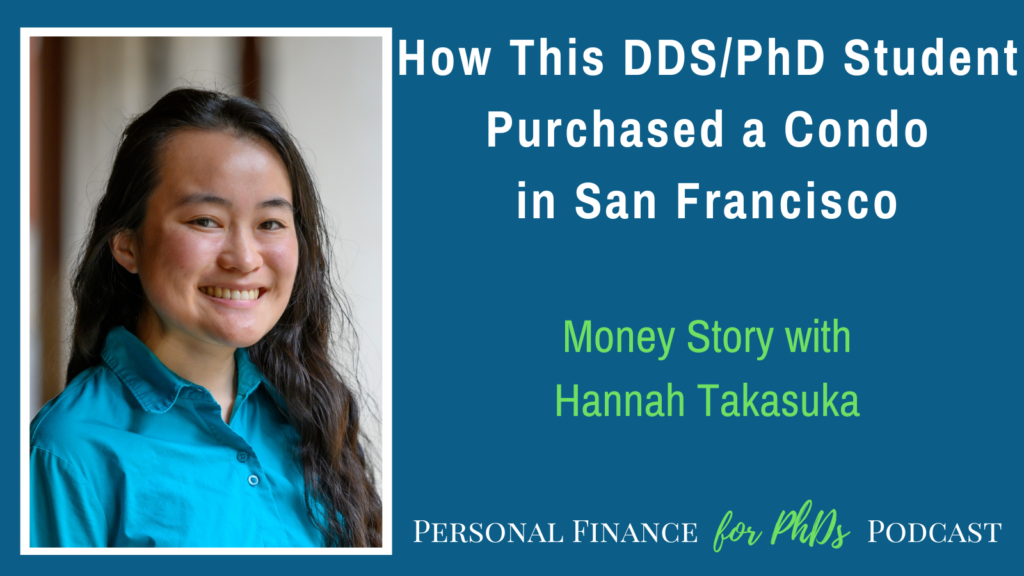
Teaser
Hannah (00:00): I’m thankful being a PhD student has taught me to normalize, “Oh shoot, I’m in trouble. Let’s ask for help.”
Introduction
Emily (00:19): Welcome to the Personal Finance for PhDs Podcast: A Higher Education in Personal Finance. This podcast is for PhDs and PhDs-to-be who want to explore the hidden curriculum of finances to learn the best practices for money management, career advancement, and advocacy for yourself and others. I’m your host, Dr. Emily Roberts, a financial educator specializing in early-career PhDs and founder of Personal Finance for PhDs.
Emily (00:49): This is Season 20, Episode 9, and today my guest is Hannah Takasuka, a 3rd-year PhD/DDS student at the University of California, San Francisco. Hannah is in the process of purchasing a condo in San Francisco as part of a governmental program to provide affordable housing. Hannah overcame multiple hurdles in the journey to home ownership, including being rejected by mortgage lenders over her fellowship income. Several puzzle pieces have to come together for any graduate student to purchase a home, and Hannah shares all the numbers and details for how it happened for her.
Emily (01:22): Because we in academia and research are experiencing such precarity in our finances and careers at the moment, I’m doing as much as I can on the financial education side to help you. I’m calling this initiative Giveaway Spring. I’m giving away 60-minute group Q&A calls, 30-minute individual coaching sessions, books, and digital resources—all completely for free—and I’m also sharing the best free financial and career resources I come across for PhDs. Register for my mailing list at PFforPhDs.com/giveaway/ to receive all the details of the current giveaways and an update every other week. By the way, this is the last episode of Season 20 of this podcast. We’ll be back with Season 21 on June 2, 2025. You can find the show notes for this episode at PFforPhDs.com/s20e9/. Without further ado, here’s my interview with Hannah Takasuka.
Will You Please Introduce Yourself Further?
Emily (02:36): I am delighted to have on the podcast today, Hannah Takasuka, who is a third year graduate student at the University of California San Francisco. And I’m really especially delighted to have Hannah on because she actually helped bring me out to campus for a workshop earlier in 2025, and that was a great experience. So here we are recording in March, 2025, and Hannah is actually under contract for her first home in San Francisco. And that is shocking. And so we’re gonna find out in the course of this interview, um, how exactly that happened. So Hannah, welcome to the podcast. I’m so glad to have you on. Um, and will you please introduce yourself a little bit further?
Hannah (03:13): Yes. Um, it’s great to talk with you, Emily. Uh, my name is Hannah. I am a third year DDS PhD student. Um, so after getting my PhD I’ll go to dental school and it’s a similar funding mechanism to the MD PhDs,
Emily (03:27): Emily here breaking in during the editing process. Following our interview recording, Hannah sent me some additional audio contextualizing our conversation and I thought it would fit well here.
Hannah (03:38): Hi, Emily and listeners of her channel. Something that I wanted to express in the podcast but I didn’t have a chance to, was a sense of humility. I do wanna give the disclaimer that, um, being able to buy a home as a third year PhD student is a huge privilege that not everyone has. Um, and people might make certain assumptions about a third year PhD home buyer, um, that like I’m someone who has everything together with my finances, um, and I wanna put down others. Um, or just that there’s this Instagram idea that you see, um, people who seem to be doing everything right in the world and you compare yourself and you think, oh, because I’m not there, I’m not sufficient enough. Um, and so as a point of humility. I still have a lot to improve in my personal finances as well, even with the basics. So at Emily’s budgeting workshop that she hosted at my university, I learned how important it is not to only forecast, um, what your budget should be, but to actually have an automatic tracking system to see how you spent your money compares to what you had projected. Um, and so that’s something that I’m still working on implementing. Um, I’m, I’m part of the way there, but not, not fully there. Um, and so again, I just want to encourage you all to make the steps that make the best sense for you. Um, and home buying in San Francisco is not going to be, is not gonna probably make sense to most, um, PhD students, but I hope that I demonstrated, um, that it is a possibility, um, for some and that it might make sense for you.
Emily (05:41): Alright, back to the interview. Now, did you move to San Francisco when you started graduate school and and what year was that?
Hannah (05:48): I did, uh, that was July, 2022.
Considering Home Ownership as Graduate Student in a High Cost of Living Area
Emily (05:51): And when you moved to San Francisco or, you know, sometime after that, obviously you started considering home ownership, which honestly is something that I would completely write off for a graduate student in San Francisco. And honestly, a lot of even professionals in San Francisco don’t own their own homes. They don’t necessarily see the math as making sense for that. So I’m just really curious about, um, why you even started considering purchasing a home.
Hannah (06:17): Mm-hmm <affirmative>. So I know I wanna be here long term. Um, at least for the next 10 years. Being a DDS PhD student means that I’m here for eight years and I’m, high cost of living cities come with pros and cons. Uh, one of the great pros though is that there’s great career opportunities. Um, and for me, I’m also blessed that I have a lot of family nearby. And so for me it just makes sense to be staying here long term and looking at market rate places. Uh, you’d be correct, Emily. The math doesn’t make sense most of the time. Um, I was going for a walk one day in my neighborhood and I saw this huge sign that said, um, middle income housing available, um, condos are $260 to $500,000. Um, and so decided to call my dad and say, Hey, I saw this sign, like 260,000 is probably way too much. ’cause I had no idea what that number meant at the time. Just sounds like a big number. Um, but my dad says, oh no, Hannah, like, you need to look into that. I’m like, okay, no, no uncertainty there that I need to look more into it. So, um, decided to look more into it and, uh, thankful that it worked out.
Emily (07:34): What does this mean? What is this middle income housing? Is the housing different than other housing or is it just that the loans are structured differently? Or what is this?
Hannah (07:45): Mm-hmm <affirmative>. It could be a combination of both. San Francisco has their permitting for housing, such that 10% of any new construction needs to be designated as below market rate housing, and then you need to fall under a certain income bracket in order to qualify for that. Um, below market rate housing, um, there is also a fee, uh, that new construction can opt out of, uh, building that 10%, uh, below market rate housing. And that fee will go towards, um, affordable housing projects. And so in my case, my entire building is, um, below market rate and run by the city.
Emily (08:26): Wow. What an incredible opportunity. Had you known anyone else who, who purchased a home as a PhD student? Like with the same sort of program?
Hannah (08:37): I do not, no.
Housing Costs and the Home Buying Process in San Francisco
Emily (08:38): Okay. So it was really just you saw a sign and you had to look it further. Amazing. Um, and also just really good on you that and your father too, for pointing you in that direction of like, oh no, like, let’s, let’s go ahead and start, you know, down this road and start investigating this. Maybe we should talk a little bit about the, the sale price of the, of the home that you’re now under contract for. Um, just so we can get an idea of like your income, how that compares to your new mortgage, and also how that would compare to maybe where you were renting before or other similar place that you might rent. Can you just give us a sense of what’s going on with these numbers? Numbers?
Hannah (09:14): Mm-hmm <affirmative>. Um, yeah, so my purchase price is gonna be 260,000, um, and my graduate student stipend is four, uh, $4,200. Um, not including the health insurance, um, but we do need to take taxes out of that. Um, and currently I rent at UCSF housing for $1,350 per month.
Emily (09:41): And your UCSF housing, um, do you have like a studio one bedroom place or do you have a roommate?
Hannah (09:47): Uh, I have a roommate and it’s a two bedroom.
Emily (09:50): Okay. And is that, would you say that that is a subsidized cost or that that’s pretty standard for what you’re getting?
Hannah (09:56): It’s a subsidized cost for sure.
Emily (09:59): Okay, interesting. So you have making the, you’ve made the decision then to move out of subsidized housing into your own owned place. Amazing. And can you tell us, is there anything else you wanna add about this, you know, this opportunity, this program that you’re participating in? Obviously what I’ve heard so far is that these builders have to make the housing available to you. Um, but is there any like special, um, way that you have to, uh, you know, submit bids on the house? Or is it just kind of like regular now that it’s made available? The, in terms of the buying process,
Hannah (10:36): There’s limitations to it. Um, and then there’s also a lottery process, um, both of which are a bit exhausting to think through, um, but can be worthwhile depending on your situation. And I’m thankful that, yeah, I worked through the different, um, thought about the different limitations. Um, so in terms of the lottery system, there were 115 units available in my building. There ended up being 400 people who applied. However, at the workshop they were letting us know that for previous below market rate buildings, um, they’ve gotten to the end of their applicant list because people would decline by the time that the offers came through. For me, I ended up, uh, being fortunate in looking into the different lottery preferences. Um, so if you’re a veteran or um, if you’ve been displaced by a fire, those are a couple of the lottery preferences. The last one is live or work in San Francisco before it goes to general population. Um, and so that’s where most of the people fall. Um, for me, because my family actually came to San Francisco in, um, the early 19 hundreds, um, my great grandmother qualified me, uh, to be considered a descendant of, uh, someone who was affected by unjustified San Francisco gentrification. And that put me in the top bracket such that I had first choice for the units that were 260,000, um, for a one person, uh, one bedroom, um, condo.
Emily (12:18): Amazing. Yeah. You clearly did a bit of legwork on this and it sounds like also you mentioned a workshop, so they’re also kind of offering a lot of information about how this process works kind of upfront, is that right?
Hannah (12:29): Mm-hmm. Yes. Yes.
Emily (12:30): And you mentioned an income limitation also. Do you recall what that was? Obviously you were under it, but you, do you know what the ceiling was?
Hannah (12:37): Mm-hmm <affirmative>. Um, it’s 80% of the area median income, uh, which I believe is about $84,000.
Explaining Graduate Student Income to Mortgage Lenders
Emily (12:43): Yeah, you’re well under that. Super fascinating. Thank you very much. This of course, will be left up as an exercise for the listener, whether their own city has anything, you know, similar in terms of affordable housing being, you know, built and all of that. So that’s awesome that you’ve brought this like to our attention. Okay. But as a graduate student, you may have income, the type of income may be unfamiliar to the lenders who were involved in this. So can you tell us that story?
Hannah (13:12): Sure. Yeah. So there’s, um, a list of maybe 20 lenders that are approved through the city. Um, and you have to pick from that list of 20 for these programs. And so I just reached out to three of them, um, sent them my income and, uh, filled out the application in which you say your employer and how much income that is. And then the next step is that they request your W2. And so I uploaded my 1098T and immediately everyone, all of those three people were confused, like, what is this? I think they’re assuming that I could be an undergraduate student with just a lot of scholarships. And so I was trying to send them a letter saying, Hey, I’m actually union protected, um, I have health insurance year round, here’s a letter from my PI. And just each lender has their different guidelines and knowledge of whether, and also whether they’re willing to look into those guidelines is kind of, um, the vibe that I was receiving. Um, and so I reached out to, uh, your brother Sam to ask how to get help with this because I didn’t seem like I could resolve it on my own.
Emily (14:29): Yeah. So for the listeners, my brother Sam Hogan is a mortgage originator. And because of our relationship, because I had told him years ago how many issues people in our community like Hannah are running into having fellowship income not documented in a way these, you know, lenders expect. Um, he started looking into it now he like specializes in this area. So plug for Sam if you have any, you know, um, questions about getting a mortgage as a first time home buyer especially, and especially, especially if you’re on fellowship, um, please reach out to him. We often do live, um, ask me anything. So if there’s one coming up, you can go to pfforphds.com/mortgage and see if there’s one coming up that you can join and chat with him. Um, but kind of like back to the story. So what happened <laugh>? Like, did you ask him questions? He gave you information to help work with the lenders? Or how did this end up resolving itself?
Hannah (15:20): I was able to learn from Sam and his videos, the language to use towards the other lenders. And so I was just very upfront in the first email saying, hi, I’m Hannah I’m a graduate student researcher. I have a 1098T I don’t have significant W2 income. Um, I know that under Fannie Mae guidelines I need to show three years continuance. And so here’s a letter that I have supporting that, which was great to know in comparison to the exhausting process of filling out the entire mortgage application and then hearing later as if it was a surprise to them.
Emily (15:58): Yeah, absolutely. And that has been, unfortunately the experience of numerous, numerous graduate students and postdocs who have this unusual income type is like, you know, the, the lenders, they look at your number, they look at your annual salary or whatever, and they’re like, oh yeah, we’re good to go. And then once it gets to the documentation stage. That’s where they pull back. And like you said, it can take quite a bit of legwork even just to get all the information over to them. So that can be really disappointing when that happens. And for other people, I know sometimes they’re under contract by that point and it’s like they’ve got a ticking clock kind of timeline that they’re working on and their lender has just said, no, we can’t work with you. Right. So that’s, that’s what ends up, um, Sam, it’s called rescuing mortgages. That’s what Sam ends up doing for a lot of PhDs is he kind of comes in like late in the process because the other lender has just figured out they’re not gonna be able to actually follow through <laugh> the way that they thought. So that can be really scary. Um, I’m glad that it sounds like you weren’t under that kind of time pressure, but you know, in searching for a lender, it, it took, um, a bit of legwork on your part. Okay. Is there anything else that you need to add to the lender aspect of the story or regarding your income?
Hannah (17:02): It took a lot of work, but I’m thankful that I did it. Um, so I, you know, I reached out to the city saying, Hey, I’ve reached out to 11 lenders on your list and they’ve all said no or ghosted me. Um, and I don’t want to, I don’t know what to do. This is the same time I was reaching out to Sam. Um, I think that I’m thankful being a PhD student has taught me to normalize, oh shoot, I’m in trouble. Let’s ask for help. Um, and I think that I’ll be able to achieve great things, um, with the help of others.
Saving for a Down Payment as a Graduate Student
Emily (17:37): Absolutely. What a great observation and attitude to have about this process. And of course you didn’t wanna let this opportunity slip you by, right? Like, this is an amazing, especially as you said, because you plan on living in San Francisco long term, what an incredible, um, time to be able to purchase. Um, I wanna hear a little bit more about the purchase details, if you don’t mind, because a lot of things have to come together for a graduate student to be able to purchase a home. So your income we’ve already discussed and how this program is particularly helping you, but you also have to consider like your debt load. Um, and you also have to consider like your credit score and down payment, although all those kinds of things. Would you be able to provide any details about how it worked in your situation?
Hannah (18:21): Sure. Um, so I’m super fortunate with a combination of, um, my family situation and my own actions that I came out of college without any debt, um, and saved about 15,000 with my first couple of years of just working. Um, and then my last year of college I had an engineering industry internship and so I was able to save about $30,000 with that by, um, living with family and not having significant housing costs. Um, yeah, and so then with a couple of years of my PhD, um, and investing with the past couple of years, uh, was able to save a hundred thousand dollars to put down for my down payment. Um, so there, there were a lot of puzzle pieces that had to come together as you mentioned. Um, and there’s a small time window in which it would work out in the sense that I need to be able to save enough to put down a decent down payment, um, to be able to afford a mortgage within the certain loan to debt ratios that the mortgage lenders require. Um, but then my income needs to be low enough and I still need to have three years of continuance <laugh>. So I don’t know if it would’ve worked if I tried a year later ’cause I don’t know if I would’ve had the three years continuance.
Emily (19:53): Right. Well that’s incredible. What an amazing accomplishment to be able to save up that much, especially starting as a college student, um, and also, you know, to invest it and so forth. Like so glad that worked out for you. Was there like a minimum down payment required or like why did you choose that number to put down? I guess did it have to be that high to make the mortgage numbers work on your income or what, what was the choice behind that?
Hannah (20:19): I learned that our health insurance part of our income isn’t considered income to the mortgage lender. And so it’s about the maximum that I can take with the mortgage and being within the debt loan ratio, which I think is about 30%. Yeah. Yeah. So that, that was the number I, I could put more of a down payment if I wanted to. Um, but I couldn’t put down too much less, um, with the HOA being $400 and then, uh, which is low for San Francisco, HOAs and San Francisco are usually about a thousand dollars. And a lot of times that’s what makes, uh, the below market rate condos that are in 90% that it’s market rate not worthwhile. Um, because for a graduate student having an HOA of a thousand dollars, that’s just like practically our whole rent.
Emily (21:10): Okay. So it sounds like, and this is something I’ve heard from Sam as well, that like, as you said, it’s a, it’s like a needle you have to thread <laugh>, like, um, you need the maximum loan it sounds like, that you could take out on your income with the interest rates available at the moment was about $160,000. That was how much they were willing to extend you. And so you needed to come up with that other a hundred thousand, um, to get to the purchase price does. Is that correct? Yeah. And that’s something that I do hear from Sam quite a bit. Like, yes, I can create a mortgage on this type of income, but the income is obviously low and especially in other areas of the country, it’s gonna be significantly lower than yours. Um, you know, there’s only so many multiples of that <laugh> you can get to until you have to get to like the housing price. And then a larger down payment can sometimes help help in this, but where does that down payment come from? In your case, you did the savings early on and obviously you’ve been very diligent to build that up. Other people, they might ask for gifts from family members to make up the difference, something like that. So there’s, you know, someone has to have the resources, but there’s a couple ways to kind of solve it. Um, incredible, incredible.
Commercial
Emily (22:20): Emily here for a brief interlude. Would you like to learn directly from me on a personal finance topic, such as taxes, goal-setting, investing, frugality, increasing income, or student loans, each tailored specifically for graduate students and postdocs? I offer seminars and workshops on these topics and more in a variety of formats. This is a perfect time to book me for a workshop at the end of the current fiscal year or at the beginning of the upcoming academic year. If you would like to bring my content to your institution, would you please recommend me as a speaker or facilitator to your university, graduate school, graduate student association, or postdoc office? My seminars are usually slated as professional development or personal wellness. Ask the potential host to go to PFforPhDs.com/financial-education/ or simply email me at [email protected] to start the process. I really appreciate these recommendations, which are the best way for me to start a conversation with a potential host. The paid work I do with universities and institutions enables me to keep producing this podcast and all my other free resources. Thank you in advance if you decide to issue a recommendation! Now back to our interview.
Similarities Between Buying a Home and Pursuing a PhD
Emily (23:45): By the way, I, I forgot to ask you earlier, but when did you start this process? Like when did you walk by the sign <laugh> and see, you know, $260,000 for a condo?
Hannah (23:54): Uh, what was it, a month before the deadline, which I think was like May 5th. So probably around early April.
Emily (24:01): Okay. So we’re coming up on a year that you’ve been in this process. Wow. Okay. But clearly getting like such a discount. Hopefully it’s, it’s been worth all this all this investment of time. Amazing. Um, were there any surprises that came up in the course in this whole process of, of pursuing this purchase?
Hannah (24:20): Uh, so it’s kind of like pursuing a PhD in my opinion, in the sense that there are gonna be challenges and you have to decide, um, if you’re gonna try to overcome them yourself by talking directly with the mortgage lender, talking directly with the city who represents the seller in this case. Um, or if you’re gonna go and ask for outside help, like from Sam for example. Um, so in my case, um, deciding to look into the lottery preferences, um, I thought that was gonna go nowhere. I just submitted my dad’s birth certificate and then I get a call from the city saying, oh, your dad doesn’t qualify, but because he’s in the neighborhood that generally does qualify, you know, there are other family names that you can run. And so, um, gave them my grandmother’s maiden name, which is how I discovered that my great-grandmother would qualify me. Um, and with a new construction place, there are a lot of government permits that need to go on. Um, that’s been exhausting in the sense that they first pitched that the first move in dates were gonna be fall 2024, uh, and I wasn’t under contract until winter. Um, and I think there’s just so much uncertainty that they don’t wanna pitch certain timelines to you ’cause they know they’re probably gonna let you down. Um, so originally they said that the close of escrow would be, um, mid-March. Um, and then due to LA fires there was, um, a delay with I think the Fannie Mae permit. Uh, so then they said it was gonna be another six weeks. Um, so all this is to say that the move in date is pretty uncertain. It’s difficult to challenge, uh, it’s difficult to balance that with the moving interest rates, even with the 30 day loan lock that they require you to do. Um, and managing that with your current lease because you wanna give your landlord the notice that they require without you being penalized heavily. Um, yeah. ’cause then they could just, if they delay it again, then I’m without housing or I need to find short-term housing.
Emily (26:53): So at this point, do you have a move out date scheduled with UCSF housing?
Hannah (26:59): I decided to take the risk, um, and set my move out date to be a month after, um, April 18th. Um, because if I didn’t schedule a move out date, then I would be charged likely until July 1st. Um, ’cause that’s generally when the, that’s their default contract end date. Um, and so I’ll need to look for a short term sublet if um, the housing doesn’t end up working out, which is yeah a risk that I’m taking.
Emily (27:34): Yeah, like you said, this is, uh, a common thing with new construction, um, that these kinds of timeline issues can come up, but yeah, it sounds like you’re working with the information you have as best as you can. Um, any other surprises you’d like to share?
Hannah (27:49): Insurance is difficult to buy in California. Um, so that was another challenge. I’m thankful that, um, AAA was still taking people, at least with the agent that I had called, ’cause apparently there were some others in my building that AAA was not writing new policies for. Um, and there are very few who are willing to insure in California.
Emily (28:15): So you said earlier that your long-term plan is to live in San Francisco. Um, how long do you think you’ll stay in this particular condo?
Hannah (28:25): I would love to stay 20 years, but it’s a good question. Will, will my life priorities change in 10 to 20 years from now? Maybe. Um, but I am thankful that my neighborhood is being zoned as a biotech hub. And so even if I do wanna leave the university, there should be great, um, job opportunities within walking distance. Um, and for me being in California and close to family, um, and being in a neighborhood that is walkable, um, instead of owning a car, um, or being reliant on a car is important to me. And, um, San Francisco is the only place that, uh, meets all those criteria.
Emily (29:09): That sounds wonderful. And certainly because of your, you know, dual degree program, you’re gonna be at UCSF presumably for, I think you said eight years total, is that right? So like five more years. Um, awesome. And let’s say if there is ever a time that you do decide you want to no longer live in this condo, are you permitted to sell it? Does it have to be to another qualifying resident or are you permitted to let, to rent it out? Like what are your options?
Hannah (29:37): Um, yeah, so that’s one of the limitations. Um, affordable housing is created, uh, so that it can be affordable for you to live there. Um, not so that apparently there was someone who found a loophole, um, that if you could just rent it out at market rate, you can make a profit off of the city program that is being funded by bonds. And so that’s just not right. Um, so they’ve made the rule that generally you can’t rent it out. Um, but there is, there are certain exceptions, um, like if you get a job offer that’s a decent distance away, um, I’m not sure if they have there, there must be a control under what you can set the rent to being so that it’s an affordable rate to someone else. Um, and then when I sell, if I were to sell the place, um, I need to sell it at the 260,000, uh, plus any documented improvements that I have made to the place, um, I don’t think that I make interest unfortunately. Um, and it needs to be to someone who is below 80% of the area meeting income.
Emily (30:53): So this home is not going to appreciate,
Hannah (30:57): Correct.
Emily (30:58): It’ll be sold at the same price plus improvements. Interesting. And do you mind sharing what your mortgage payment is going to be? Especially how that compares to like what you were paying, what you’re paying currently in UCSF housing?
Hannah (31:11): My mortgage payment is gonna be $950. Um, combined with HOA property tax utilities, I am expecting to pay 1800 a month.
Emily (31:23): So somewhat higher than your current rent. But you get to live on your own. Um, and you get that stability. Yeah. So this really seems like the impression I’m getting from our conversation is this, for you is a play to be able to stay in the city in a neighborhood you like in a place that’s, that works for you. Um, and just to have that assurance that you’re an owner and you get to be there long term. Is that right?
Hannah (31:47): Yes. Yes. Uhhuh
Emily (31:49): Very good. Um, and you said when you applied for the podcast that you had kind of a message for other PhD students regarding home ownership. Would you like to express that now?
Hannah (32:00): You know, just like when I was playing soccer, I would say you miss a hundred percent of the goals of you don’t take. Um, so you know, you could shoot a soccer ball to try to be a homeowner, um, and it might be totally off the first time. You might look at a market rate place and say, oh my gosh, the HOA is way too expensive. Um, but you know, you’ve learned something, you’ll shoot the ball better next time. And um, maybe it’ll make it to the goal or maybe it won’t. Um, but, uh, personal finance, um, even outside of home ownership is something that you can take in small steps. Um, and it’s okay that the first steps that you take aren’t gonna get you 90% of the way there. Um, but with endurance, um, uh, you’ll be able to be in a much better position than if you were paralyzed, um, with the idea of starting nowhere.
Emily (33:02): I totally agree. I’m glad that you expanded that beyond home ownership to personal finance in general. ’cause that’s exactly how I feel about it. Like, um, as you said, don’t, don’t be paralyzed. Just start taking the steps that you can take and you’ll be better off for it a year or five years or whatever from now. Um, and especially once your income increases post PhD, um, you’ll have the skills, you’ll have the mindsets, or at least you’ll be in a better spot with respect to the skills and mindsets to be able to manage your money at that time when the stakes are a bit higher. Um, exactly. So yeah, I’m so glad you said that.
Best Financial Advice for Another Early-Career PhD
Emily (33:31): Um, what is your, this is the question I conclude all my interviews with what is your best financial advice for another early career PhD? And it could be something we’ve touched on in the interview already, or it could be something completely new,
Hannah (33:44): Turning unpredictable costs into predictable costs, um, by budgeting a certain amount per month so that you’re able to spend your money in the ways that are valuable to you.
Emily (33:58): Very good, very well put. And you are definitely gonna be putting that to use as a homeowner <laugh>, turning those unpredictable home maintenance and repairs costs into something manageable for your budget. So awesome. Hannah, it’s been lovely to you again and get this story. I’m so excited for you in this new, um, phase of your financial journey and congratulations and thank you so much for coming on the podcast.
Hannah (34:20): Yeah, thank you so much for having me, Emily.
Outro
Emily (34:32): Listeners, thank you for joining me for this episode! I have a gift for you! You know that final question I ask of all my guests regarding their best financial advice? My team has collected short summaries of all the answers ever given on the podcast into a document that is updated with each new episode release. You can gain access to it by registering for my mailing list at PFforPhDs.com/advice/. Would you like to access transcripts or videos of each episode? I link the show notes for each episode from PFforPhDs.com/podcast/. See you in the next episode, and remember: You don’t have to have a PhD to succeed with personal finance… but it helps! Nothing you hear on this podcast should be taken as financial, tax, or legal advice for any individual. The music is “Stages of Awakening” by Podington Bear from the Free Music Archive and is shared under CC by NC. Podcast editing by me and show notes creation by Dr. Jill Hoffman.
